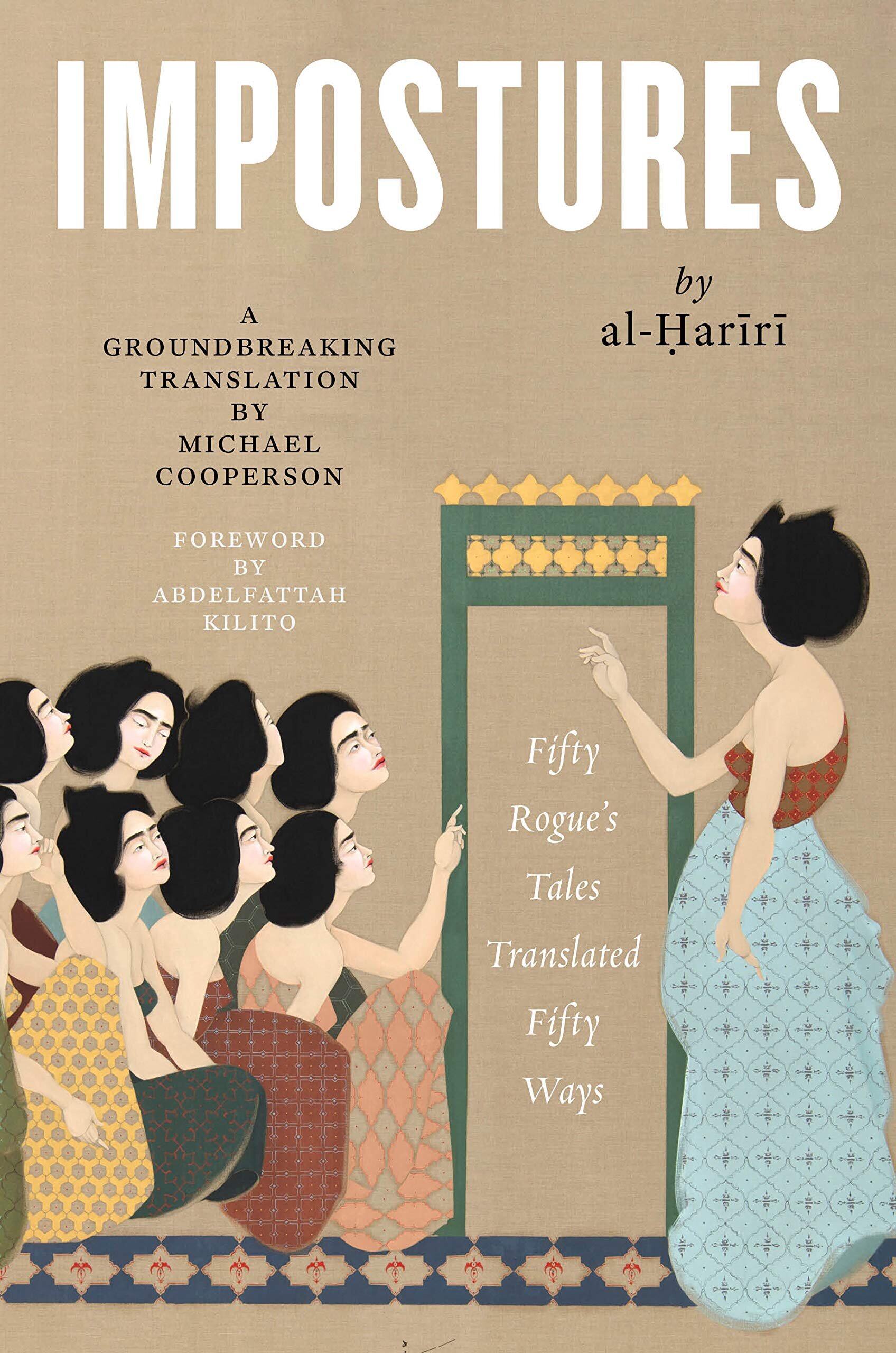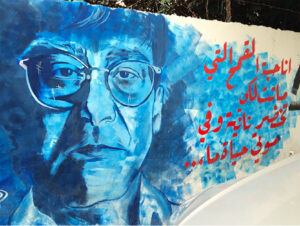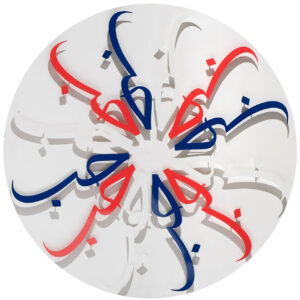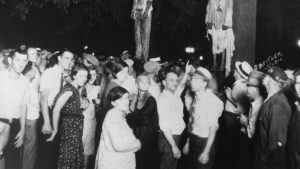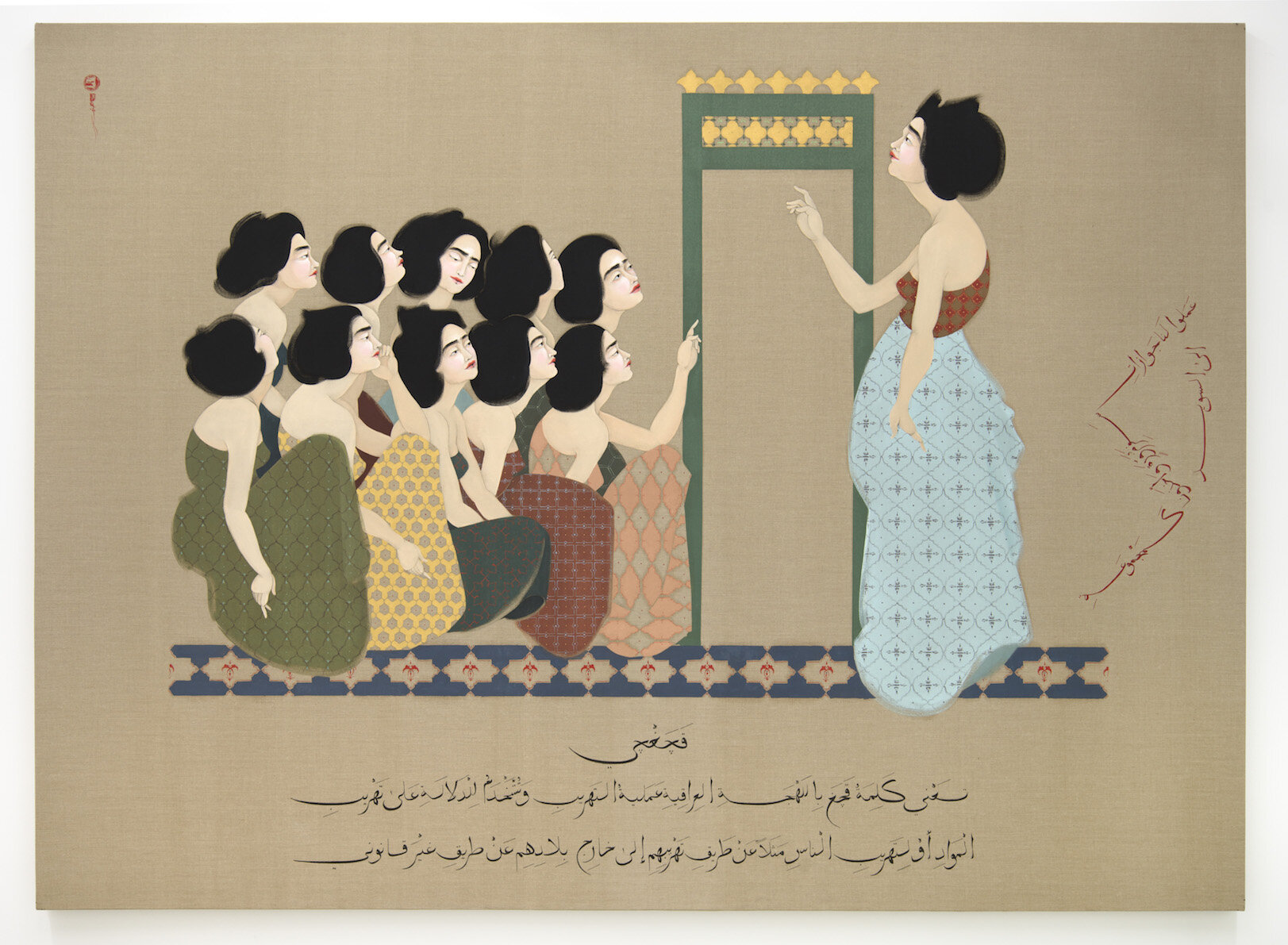
Impostures by Al-Hariri, translated by Michael Cooperson
Foreword by Abdelfattah Kilito
NYU Press (2020)
ISBN 9781479800841
Farah Abdessamad
A new English translation of Impostures from Basra-born Al-Harīrī (aka the Arab poet known as Abū Muhammad al-Qāsim ibn Alī ibn Muhammad ibn Uthmān al-Harīrī) revives the “eloquent rogue” genre of classical Arabic literature and follows the medieval adventures of a cheeky impersonator-in-chief, Abu Zayd. Through his elaborate trickeries, Abu Zayd superimposes reality with confounding pretence. Ebullient, extravagant and picaresque, his character metamorphoses and uses different decoys to fool his audience. Is the world around him all that gullible? Maybe not.
We encounter the histrionic Abu Zayd in the text from the point of view of Al Harith, an Arab traveler whose path intertwines with the former in each chapter. In the first “Imposture”, translated in the informal vein of Mark Twain’s Huckleberry Finn, Al Harith runs into Abu Zayd acting under the semblance of a preacher in Sana’a, Yemen. “Was we prepared to die?” Abu Zayd is reported to ask an assembled crowd in an impassionate speech (“maqamat” in Arabic, loosely translated as “impostures”, refers to a standing gathering). Al Harith describes a captivating and exuberant man in Abu Zayd who presses for closeness with God. He declaims verses and instantly charms his audience. As Abu Zayd is about to part ways with the Sana’ani assembly, the crowd hurries to tip and thank him. Abu Zayd leaves, ostensibly refusing the company of spontaneous followers while walking away. Curious about the character’s desire to be left alone, Al Harith hides and decides to sneak after him.
He finds Abu Zayd in a cave and sees him at once as a fake pseudo-modest preacher. Al Harith surveys the room and discovers an abundance of luxury foods, including date wine which keeps Abu Zayd company. Al Harith understands at once that the talented man who had animated the crowd so fervently is nothing more than a hypocrite, a scammer.
We follow the pair—traveler Al Harith who encounters impostor Abu Zayd in various settings of the medieval Islamic world—in fifty tale-like vignettes. The pattern is one of stage setting, and a recognition moment whereby Al Harith identifies the familiar Abu Zayd, and unweaves his lies. There is no apparent narrative progression or connection from one “Imposture” to the next.
“It is untranslatable,” one of my family members immediately told me when I mentioned this review. “Even in Arabic one needs insights.” I became a little intimidated and rightly so.
Originally written in the 12th century, Impostures belongs to the canon of Arabic literature. The genre of “impostures” is as much a permeating theme as a dedicated and unique form. “Studded with the gems of oratory, salted with the table-talk of cultivated men, and emblazoned with verses of the Koran, they are replete with figures and allegories, proverbs and maxims, literary subtleties and grammatical enigmas, and judgments on disputed points of speech,” Al-Harīrī introduces. Is Impostures then a checkmate, a parody, a subversion, dilettante artistry or a pragmatic pedagogical device?
Depending on whom one asks, either one, several or all of the above—it remains ambiguous. The book’s foreword, written by Abdelfattah Kilito, is sweepingly eloquent. It contextualizes Al-Harīrī’s text, itself presumably a pastiche of an earlier work by writer Al Hamadani whom he wound up surpassing.
As experienced scholar and translator Michael Cooperson also realized, translating Al-Harīrī (after editing an Arabic-only version of Impostures in 2020) would be about delicate choices. Cooperson, Associate Professor of Arabic at the University of California, Los Angeles, notably translated The Life of Ibn Ḥanbal by Ibn al-Jawzī (2016) for which he won a Sheikh Hamad Award for Translation and International Understanding. He also published a study on pre-modern Arabic biographies and their role in transmission and heirship (Classical Arabic Biography: The Heirs of the Prophet in the Age of al-Ma’mūn, 2000) and a dedicated, multifaceted biography of Abbasid Caliph Al Ma’mun (2005). For Impostures, he decided on a re-interpretation approach rather than literal translation. It’s an innovative and bold take, and it helps to keep this in mind when diving into the book. To emulate the diversity and richness of Al-Harīrī’s prose and verses, Cooperson mobilizes an extraordinary range of English languages, dialects and pidgins. He provides a unique platform for Al-Harīrī to converse in translation with Virginia Woolf, a 19th-century operetta, Singlish, Cockney, Jamaican English, L.A. slang and more.
The fact that Cooperson mobilized other scholars to collaborate on Impostures and transport Al Harīrī’s voice to the 21st century is a touching homage to respect and tolerance at a time when it remains tempting for some to maintain fences and walls between people and civilizations. The translation emulates linguistic prowess but leaves the reader under a dizzying spell, as we learn more about the variety (and limits) of over a dozen forms of English and the English-speaking world through different historical periods, rather than only classical Arabic, medieval Baghdad, Aleppo, or Basra. The choice of translation overlays another cultural dimension to the original text which overall, more rigorist readers may find distracting. It generated lingering questions for me, which is easy of course from the standpoint of a reader than as a translator immersed in a Herculean task. Does one need such a profusion of commentaries, glossaries and annotations to convey meaning and contemporary resonance? Was there no alternative to let the work speak for itself, rather than give the feeling of speaking over it? It’s a tricky balance, and a subjective judgement call.
Language—whether original or translated—isn’t just about syntax, grammar and style. It relates to a web of meaning and our relation to truth. Texts that may appear foreign, owing to their themes, provenance, or the time in which they were written for instance, can be malleable beyond semantics. First applied to religious scripts, Hermeneutics, a discipline defined as the interpretation of meaning, has expanded to a range of inquiries. Jonathan L Best, in A Postmodern Theology of Ritual Action (2019), proposes that “interpretation can help us overcome the remoteness between us and the object of interpretation,” adding that the goal of interpretation is “to make the remote familiar.”
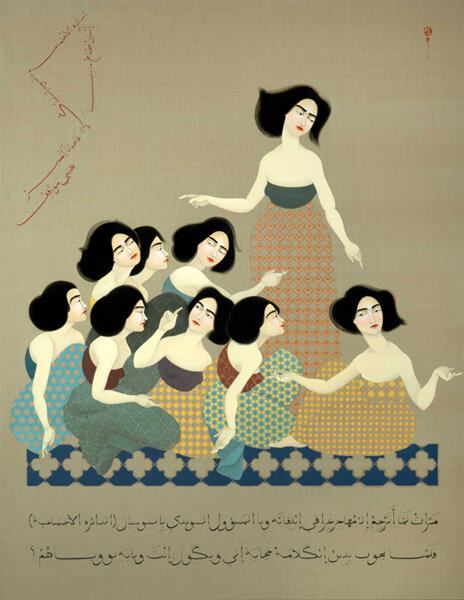
French philosopher Paul Ricœur explained interpretation as a conquest, of “a distance between the past cultural epoch to which the text belongs and the interpreter himself [or herself]. By overcoming this distance, by making himself [or herself] contemporary with the text, the exegete can appropriate its meaning” (“Existence and Hermeneutics”, in The Conflict of Interpretations, 1974).
Interpretation then, is an appropriation process which involves the self—e.g. translator, reader, editor, publisher—beyond the automatic application of literary, philological or linguistic techniques and devices. Texts are living documents and language influences over how we perceive and interact with the world. Language shapes a reality which can evolve over time. In Impostures, Arabic, the language of truth and divine revelation of God’s law, is used by its protagonist to dupe others. (Also in the Bible, “In the beginning was the Word, and the Word was with God, and the Word was God.”) This apparent contradiction reveals a duality; a language can be both sacred and profane, with symbolic cues hidden from more mainstream or demotic usages. One can adopt a textual, literal approach to interpretation, or embrace a more allegorical one.
At the end of Impostures, Abu Zayd renounces his artifices and finds God. His journey could be perceived as one towards truth, bliss and religion, or it could illustrate what Ibn Khaldun laconically once opined: “Time wears us out.” Did Abu Zayd realize his wrong path, or did he momentarily pause to recoup for yet-another game? Given the Islamic scholarly tradition of causality and predestination, one leans to the former without excluding the latter.
Longlisted for the 2020 Sheikh Zayed Book Award (translation category) and a finalist for the 2021 PROSE Award (literature category), Impostures stands out as a singular and unclassifiable work. Though not everyone will agree with Cooperson’s novel stance to translation, he masterfully (and resourcefully) demonstrates that Al-Harīrī can be translated—just not how one would expect.



